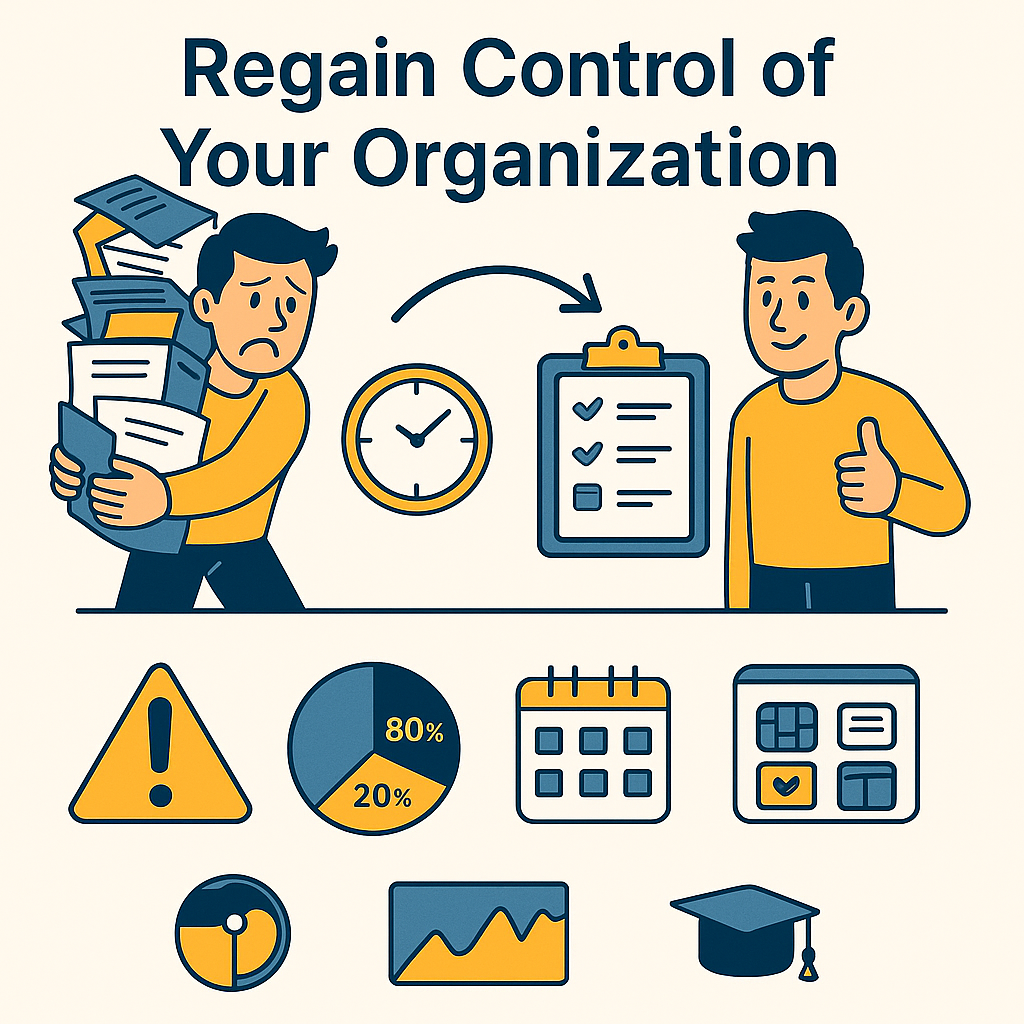Introduction: when everything feels chaotic, it’s not just a discipline problem
When we talk about disorganization, we often assume it stems from a lack of rigor or motivation. But in reality, the root cause is often something else:
- A constant stream of disruptive urgencies,
- Blurry or shifting priorities,
- Misused or unsynchronized tools,
- Scattered energy spent on low-value tasks.
The result? We work a lot, rush from task to task, but make little real progress. And worse: we burn out mentally. Decision-making slows, tension rises, and motivation steadily drops.
The first key to restoring lasting efficiency is to regain control over how you organize work. And it’s not about working harder — it’s about gaining clarity.
The foundations of a healthy organization: clarity, priorities, and a shared framework
The goal of this lever isn’t to do more. It’s to do better, with more peace of mind and less friction. It’s what people sometimes call “working on the system” instead of “in the system.”
We start by removing invisible blockers:
- Constant pings that shatter focus,
- Time-consuming tasks with no measurable impact,
- Overloaded schedules that leave no space to think.
To reset the foundation, I use several simple but powerful principles:
1. Distinguish urgent vs important (hello Eisenhower)
Just because something is urgent doesn’t mean it’s important.
This distinction changes everything. It helps you take control of your schedule, say no more confidently, and make space for what truly matters. The Eisenhower Matrix is a great tool for sorting tasks objectively and efficiently.
2. Focus on the 20% that drives 80% of results (Pareto principle)
20% of your efforts generate 80% of your outcomes.
The trick is knowing where that 20% lies. This requires regularly reviewing your task lists and asking: “Does this actually create value?” or “If I could only do one thing this week, what would it be?” These simple questions prevent productivity from becoming mere busyness.
3. Apply Parkinson’s Law
Work expands to fill the time allotted to it.
Time-limiting your tasks (timeboxing) encourages focus and prevents overpolishing. The Pomodoro technique and deep work blocks are practical ways to deliver better results without overextending.
Equip your organization (without overloading it)
You don’t need fancy dashboards or enterprise tools to create clarity. The real value lies in intentional use of tools.
Here’s what I typically recommend to the teams I work with:
- Trello to visualize workflow (backlog, in progress, done),
- Google Calendar to set visible focus blocks and deadlines,
- Notion to centralize documentation, meeting notes, and rituals.
But tools are only as useful as the shared habits behind them. Too often, teams adopt tools without defining how to use them together — which creates even more confusion.
Introduce simple but powerful routines
Organization isn’t about individual willpower. It’s about shared and stable team habits. Here are a few light but effective rituals:
- A weekly planning meeting (30 minutes max) to align on goals,
- A short end-of-week review to reflect and adjust,
- Protected time in your calendar for deep work or strategic tasks — if it’s not scheduled, it won’t happen.
These rituals help teams move from reactive to proactive, and create a more fluid, predictable pace.
Regaining control also means freeing mental space
When the framework is clear, priorities are aligned, and tools support the work (instead of distracting from it), then:
✅ We breathe easier.
✅ We make more thoughtful decisions.
✅ We collaborate with less friction.
✅ And we break the cycle of constant multitasking.
The mental space that’s freed up can finally be redirected where it matters: strategy, creativity, leadership, or simply producing higher-quality work.
What’s the main issue with your personal or team organization today?
Too many meetings? No clear framework? A busy schedule?
I’d be happy to discuss this with you, in the comments or via private message.


Leave a Reply